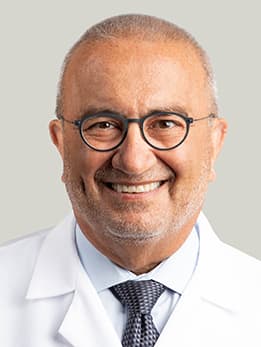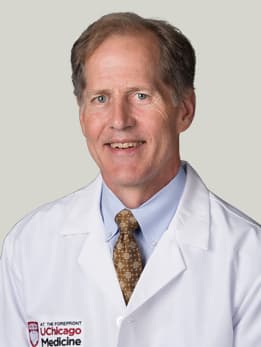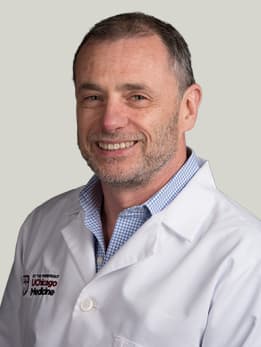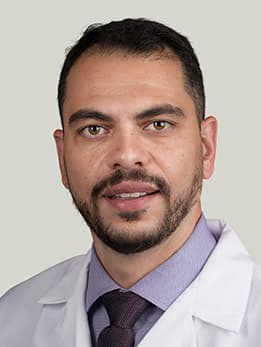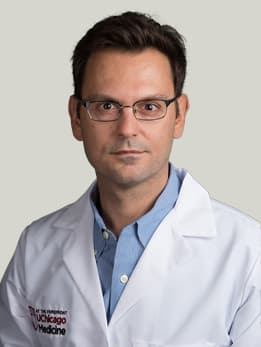Comprehensive Stroke Center
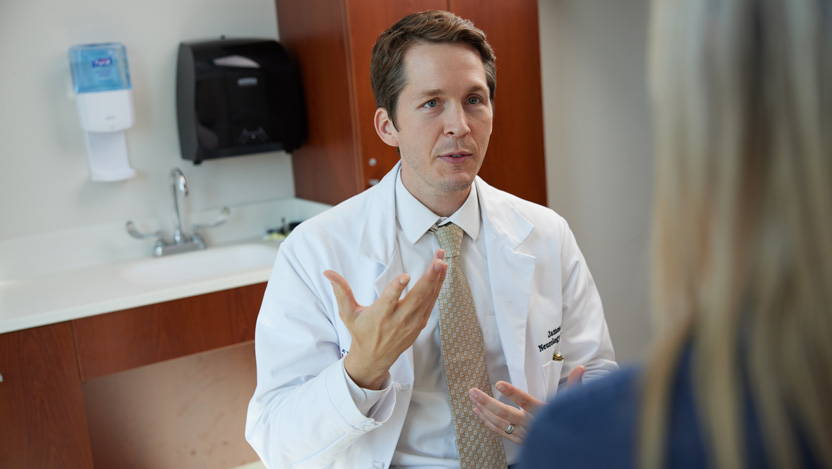
Comprehensive Stroke Center
The University of Chicago Medicine has two nationally recognized stroke centers, including our Joint Commission-certified Comprehensive Stroke Center in Hyde Park. This designation is considered a "Gold Seal of Approval" and recognizes the exceptional efforts of the UChicago Medicine Stroke Center team to provide advanced care according to the latest stroke treatment standards, and to strive for continuous improvement in care. The Stroke Center has also achieved the “Gold Plus” award from the American Heart Association (AHA).
High Performing in Stroke
According to U.S. News & World Report's 2024-25 Rankings
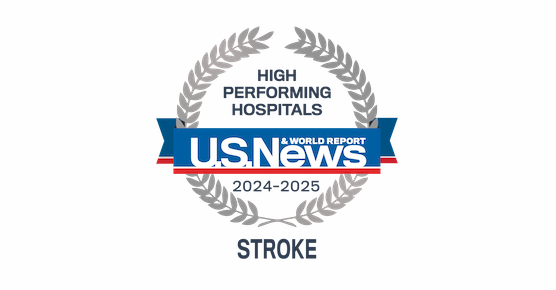
Gold Seal of Approval
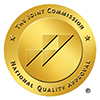
As a recognized Comprehensive Stroke Center, the University of Chicago Medicine has all the critical elements to deliver high-quality medical care to achieve the best long-term outcomes for people affected by stroke. In addition, our unique expertise in neurointensive care differentiates us from other stroke centers and allows our team to provide exceptional care to patients with brain hemorrhages and other life-threatening severe strokes.
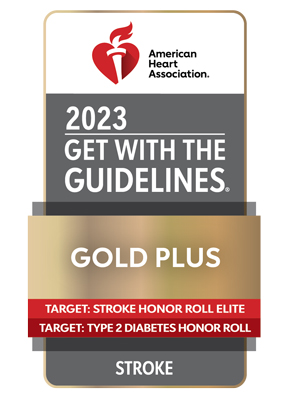
Gold Plus Award
Hospitals receiving the Get With The Guidelines Gold Plus Achievement Award have reached an aggressive goal of treating patients with 85 percent or higher compliance to core standard levels of care for two consecutive calendar years, as outlined by the American Heart Association/American Stroke Association. In addition, those hospitals have demonstrated 75 percent compliance to four out of 10 heart failure quality measures or seven out of 10 stroke quality measures during a 12-month period.
Our goal is to fully support patients along their entire journey from stroke to recovery, both while they’re in the hospital and after they have left. We provide the following resources to patients to make their transitions as seamless and safe as possible:
- Remote patient monitoring (RPM). Stroke patients are sent home with a tablet that provides stroke education and videos on how to appropriately conduct and track various screenings. The RPM device tracks the daily results of their blood pressure, depression and swallow screenings, as well as glucose levels for patients with diabetes. If the results of any of these tests are outside normal parameters, then a specialized nurse will follow up by phone to assess if any interventions are needed.
- Community health workers work with patients who are discharged to their homes and assist these patients with follow-up appointments and stroke education. They ensure patients are taking medications appropriately, monitoring their vital signs and using the remote patient monitoring tablet correctly. Community health workers also make sure each patient has access to food and a safe home environment.
- Population health care coordination nurses work with patients who are discharged to a post-acute rehabilitation center to ensure these patients have follow-up appointments with the appropriate providers and are receiving the care they need from their rehab facility.
The UChicago Medicine Heart-Brain Clinic provides specialized treatment options and preventive care for patients with heart conditions that increase their risk of stroke.
Our patients are cared for in designated stroke units equipped with the latest medical technology for stroke care. This includes our neurointensive care unit, one of the most reputable clinical programs in this field in the country.
Our team is always available for rapid evaluation and treatment of patients with stroke and other cerebrovascular problems. UChicago Medicine is one of the few major medical centers in the region with an acute stroke care team that is available 24 hours a day, seven days a week.
| Measure | 2021 | 2022 | 2023 | Total Events | Total Cases | Percentage | |||
| CEA (stroke or death) | 1 | 26 | 0 | 18 | 0 | 16 | 1 | 60 | 2% |
| CAS (stroke or death) | 0 | 30 | 1 | 23 | 2 | 22 | 3 | 75 | 4% |
| Diagnostic Neuroangiography (stroke or death) | 0 | 130 | 1 | 135 | 0 | 143 | 1 | 408 | .2% |
| Aneurysm Clipping (mortality) | 1 | 20 | 0 | 10 | 0 | 24 | 1 | 54 | 2% |
| Aneurysm Coiling (mortality) | 4 | 34 | 3 | 47 | 6 | 73 | 13 | 154 | 8% |
| Subarachnoid Hemorrhage (mortality) | 7 | 38 | 8 | 32 | 12 | 59 | 27 | 128 | 21% |
| Intracerebral Hemorrhage (mortality) | 32 | 153 | 39 | 167 | 57 | 268 | 128 | 588 | 22% |
| Ischemic Stroke (mortality) | 40 | 602 | 38 | 569 | 49 | 909 | 82 | 2080 | 4% |
| Measure- Carotid Procedures | 2021 | 2022 | 2023 | Total Events | Total Cases | Percentage | |||
| Asymptomatic Carotid (stroke or death) | 1 | 30 | 1 | 20 | 0 | 16 | 2 | 66 | 3% |
| Symptomatic Carotid (stroke or death) | 0 | 26 | 0 | 21 | 2 | 22 | 2 | 69 | 3% |
UChicago Medicine Ingalls Memorial Stroke Center of Excellence
UChicago Medicine Ingalls Memorial developed its stroke center in 2006 to increase awareness of stroke symptoms and prevention–and to diagnose and treat stroke patients as quickly as possible. Under the medical direction of board-certified neurologist Engin Yilmaz, MD, the Stroke Center integrates the services of the emergency department, nursing, radiology, laboratory, pharmacy and rehabilitation. This multidisciplinary approach to stroke management covers all aspects of stroke care, from prevention and diagnosis to acute care and rehabilitation.
In addition to emergent and acute inpatient care for stroke patients, UChicago Medicine Ingalls Memorial offers a full continuum of care, including rehabilitation and support both on an inpatient and outpatient basis.
Our interdisciplinary stroke team meets on a monthly basis to review stroke performance improvement, quality measures, treatment protocols, clinical practice guidelines and to educate stroke patients, the community and staff.
As part of its dedicated Stroke Center, UChicago Medicine Ingalls Memorial developed and implemented a stroke protocol according to the American Stroke Association's guidelines and recommendations to ensure that stroke patients are diagnosed and treated quickly. The protocol includes the immediate availability of a CT scan within minutes of a patient's arrival to the Emergency Department, and administration of clot-busting drugs in selected patients.
Our specialists also offer outpatient rehabilitative services in Calumet City, Flossmoor and Tinley Park.
Expedited patient transfer, urgent transfers and consultations
If you are a healthcare provider and wish to transfer a patient with a neurologic emergency or to speak with our team directly, call our dedicated NeuroICU transfer line at 1-773-834-6742. It will be answered by an attending neuro-intensivist, addressing ischemic stroke, brain bleeding, status epilepticus, neurotrauma, hydrocephalus, tumors and other neurologic emergencies.
If requested, we will facilitate seamless transfer and make arrangements for bed assignment
To schedule a consultation for a less urgent neurovascular condition, call us at:
- Stroke Neurology: 773-702-6222
- Neurovascular Surgery: 773-702-2123
- Neurointerventional Surgery: 773-702-5004

